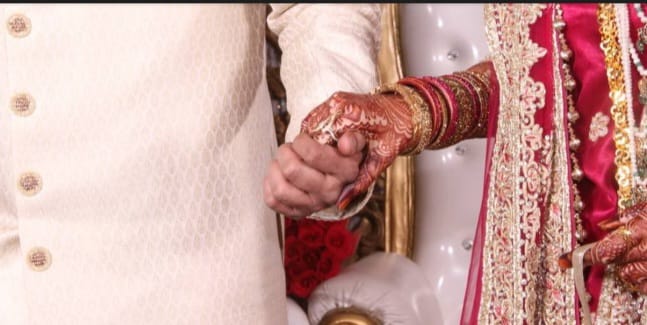By: Juliana Twumwaa Obeng
The writer

Embracing Love without boundaries: Knots Tied in Sharia
The Gambia is a predominantly Muslim country, but there are also significant Christian and traditional religious communities. In general, interfaith marriages between Muslims and Christians are relatively common in The Gambia, and they are usually accepted as long as both partners respect each other’s faith and culture.
In The Gambia, the Cadi Court is a court that has jurisdiction over Islamic personal law matters. The court is responsible for adjudicating cases related to marriage, divorce, inheritance, and other related issues based on Islamic principles. The Cadi Court is a Shariah court in The Gambia that has jurisdiction over matters related to Islamic personal law, including marriage and divorce. Islamic marriage in The Gambia is governed by the Shariah law, which is based on the Quran and the teachings of the Prophet Muhammed.
One question that often arises in the context of the Cadi Court’s jurisdiction is whether a Christian can marry a Muslim in The Gambia.
The answer to this question based on my research is yes, a Christian can marry a Muslim in The Gambia under certain circumstances. According to the Cadi Court rules, a marriage between a Christian and a Muslim is permitted as long as certain conditions are met.
One of the conditions that must be met is that the Christian spouse must be willing to convert to Islam. The conversion must be a genuine and voluntary act, and the Cadi Court will verify that the conversion was not coerced in any way. The court will also ensure that the convert understands the basic principles of Islam and is willing to live according to those principles.
Another condition that must be met is that the Muslim spouse must obtain the consent of his or her parents or guardians. This is because Islamic law places a great deal of importance on the consent of parents or guardians in matters of marriage. The consent of the Christian spouse’s parents or guardians is also required, although this may be waived in certain circumstances.
The Cadi Court rules also require that the marriage contract (nikah), be performed according to Islamic principles. The nikah is a contract between the two parties that establishes their rights and obligations in the marriage. It must be performed in the presence of at least two witnesses and must include the payment of a dowry by the groom to the bride.
The legal requirements for marriage vary depending on whether the ceremony is religious or civil. For a religious marriage, the couple must obtain a marriage certificate from their respective religious authorities. For a civil marriage, the couple must obtain a marriage license from the Registrar General’s office and have the ceremony performed by a magistrate or other authorized official.
Once these conditions are met, the marriage between a Christian and a Muslim is considered valid under Islamic law and is recognized by the Cadi Court. The couple is subject to the same rights and obligations as any other married couple under Islamic law.
It is important to note that the Cadi Court’s jurisdiction is limited to matters of Islamic personal law, and it does not have the authority to recognize marriages that do not meet the conditions outlined above. For example, if a Christian and a Muslim were to marry without the Christian spouse converting to Islam or without the necessary consent from parents or guardians, the Cadi Court would not recognize the marriage as valid.
Under Islamic law, a marriage may be nullified if it is found to be invalid from the outset. Some of the common grounds for the nullification of marriage include:
- Lack of legal capacity: The parties must have legal capacity to enter into a marriage contract. For example, if one of the parties is under the age of consent, the marriage may be nullified;
- Non-observance of essential elements: The marriage contract must include the essential elements of offer, acceptance, and consideration (mahr). If any of these elements are missing or invalid, the marriage may be nullified;
- Legal impediments: The marriage may be nullified if there are legal impediments such as blood relationship or prior marriage that render the marriage contract invalid;
- Fraud or misrepresentation: If one of the parties entered into the marriage contract based on fraud or misrepresentation, the marriage may be nullified;
- Coercion or duress: If one of the parties was forced or coerced into entering into the marriage contract, the marriage may be nullified.
What happens then?
If a marriage is nullified by the Cadi Court, it is considered to have never existed from a legal perspective, and the parties are free to enter into a new marriage contract if they so choose.
In a study published in the Journal of Muslim Minority Affairs, Jllow et al. (2010), explored the challenges facing Muslim family law in The Gambia, including issues related to interfaith marriages. They noted that while there is no explicit prohibition on Muslim-Christian marriages in The Gambia, such marriages are still relatively uncommon due to cultural and religious differences between the two faiths.
A 2018 article in The Point, a Gambian newspaper, highlighted the story of a Muslim-Christian couple who had been married for over a decade. The article noted that the couple had faced some initial resistance from their families due to their religious differences, but had been able to build a strong and happy marriage based on mutual respect and understanding.
In her 2014 book, “Marriage in Contemporary Islamic Legal Discourse,” legal scholar Lena Larsen examined the Islamic legal principles surrounding interfaith marriages, including those between Muslims and Christians. While her research focused primarily on the Middle East and North Africa, she noted that the same principles apply in other Muslim-majority countries, including The Gambia.
Parting Words
Based on the Cadi Court rules in The Gambia, a Christian can marry a Muslim as long as certain conditions are met. These conditions include the voluntary conversion of the Christian spouse to Islam, the consent of parents or guardians, and the performance of the marriage contract according to Islamic principles. The Cadi Court will only recognize marriages that meet these conditions and are considered valid under Islamic law.
It is important to note that the rules and procedures of the Cadi Court are subject to interpretation and may vary depending on the specific circumstances of each case. Couples who are considering an Islamic marriage in The Gambia should seek guidance from a qualified Islamic scholar or lawyer to ensure that their marriage contract complies with the requirements of Islamic law.
The writer is a BL candidate at the Gambia Law School. She is driven by her affinity to the legal profession and relies on Precedents and Acts of the National Assembly to educate the public on bits and pieces of the application of the Laws of the Gambia and Ethics of the legal profession. These write-ups are for educational purposes only and not to serve as a substitute for Legal Advice. Email: [email protected]
References:
The Gambia: Cadi Court Act, 2005
The Gambia: Marriage Act, 1945
- Jallow, A. Saine, & E. Saine. (2010). Muslim Family Law in The Gambia: Progress and Challenges. Journal of Muslim Minority Affairs, 30(1), 39-52.




